Forgotten Sci-Fi Movies From the Early 1990s
We may remember Independence Day, The Matrix, The Phantom Menace. But what about these forgotten 90s sci-fi films? And are any worth seeing?
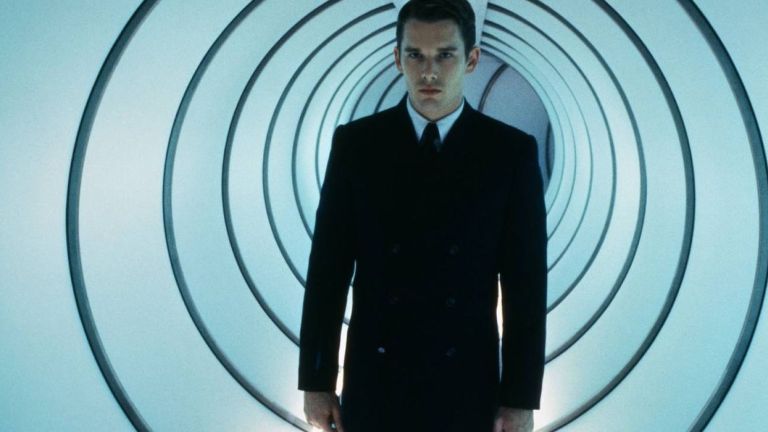
Think back to the science fiction cinema of the 1990s, and some of the decade’s biggest box-office hits will immediately spring to mind: The Phantom Menace, Jurassic Park, Independence Day, Men In Black, Armageddon, and Terminator 2 were all in the top 20 most lucrative films of the era.
But what about the sci-fi films of the 1990s that failed to make even close to the same cultural and financial impact of those big hitters? These are the films this list is devoted to – the flops, the straight-to-video releases, the low-budget and critically-derided. We’ve picked 50 live-action films that fit these criteria, and dug them up to see whether they’re still worth watching in the 21st century.
So here’s a mix of everything from hidden classics to forgettable dreck, with a few films falling somewhere in between…
Abraxas: Guardian Of The Universe (1990)
This, surely, is the best title of any 90s sci-fi film. Jesse “The Body” Ventura stars as intergalactic cop Abraxas, who ends up fighting his rogue ex-partner Secundus (an equally beefy Sven-Ole Thorsen), who’s gone rogue, fathered a child (by touching a woman’s belly and immediately making her pregnant) and hopes to use the offspring as a means of gaining unlimited powers. Look out for Jim Belushi in a small role as a school principal.
Is it worth seeing? It’s as batty as it sounds, so yes.
Available on: Amazon US, Amazon UK
Solar Crisis (1990)
Before its release, Solar Crisis seemed to have plenty going for it: a starry cast, including Peter Boyle, Jack Palance and Charlton Heston, design by Syd Mead and direction from Richard C Sarafian (Vanishing Point). Unfortunately, the result was a hokey mess that clearly had some problems raging behind the scenes – Sarafian ultimately took his name off the movie, leaving it credited to one Alan Smithee instead.
About a mission to throw a bomb at our tyrannical sun, Solar Crisis suffers from a ponderous pace and a groan-inducing script, and even some decent pre-digital effects couldn’t save this one from box-office oblivion.
Is it worth seeing? The morbidly curious might get some fun out of it, but for a superior sun-bombing experience, see Danny Boyle’s Sunshine instead.
Available on: Amazon US
I Come in Peace (1990)
I Come In Peace is a bit like Predator relocated to the streets of Texas. Dolph Lundgren plays a cop on the hunt for vicious drug dealers, only to discover that one of them is an alien that kills its victims with a deadly flying disc. A sci-fi buddy-cop thriller (Lundgren’s partnered with an alien cop name Azeck), it doesn’t win many marks for originality, but the action’s decent, it doesn’t take itself too seriously, and Jan Hammer provides the soundtrack.
Is it worth seeing? There are worse ways to spend an evening, put it that way.
Available on: Amazon US
Hardware (1990)
It’s sad to think that, at the dawn of the 1990s, Richard Stanley was being hailed as one of Britain’s finest young directors. But as the 2014 documentary Lost Soul reveals, his career was unfairly cut short by the infamously nightmarish production of The Island Of Doctor Moreau. Go back to his debut, Hardware, and you can why see he was such a promising filmmaker. Its story, about a military robot putting itself back together and menacing a post-apocalyptic ghetto, is a familiar one, but Stanley gives it real verve – Hardware has a stylish, artistic edge that most low-budget genre films of the period sorely lacked.
Is it worth seeing? Oh yes – and so too is Stanley’s second film, Dust Devil.
Moon 44 (1990)
Before he became famous as Hollywood’s new Master of Disaster (taking over from Irwin Allen), Independence Day and 2012 director Roland Emmerich made this mid-to-low budget sci-fi oddity. About a group of helicopter pilots hired to protect a space mining colony (yes, really), it nominally stars Malcolm McDowell as the villain, but he’s only really in about five scenes. Some quaint special effects and set design are the few memorable things in this oddly tepid debut from a director now known the world over for his flamboyant destruction of civic buildings.
Is it worth seeing? As a glimpse of Emmerich: the early years, just about.
Available on: Amazon UK
Robot Jox (1990)
Courtesy of Re-Animator director Stuart Gordon, here’s America’s proto Pacific Rim. In a post-apocalyptic future, wars between nations are settled not by armies and missiles, but by pitting giant robots against each other in gladiatorial matches. Achilles (Gary Graham) is the west’s finest robot operator – that is, until he has a Tom Cruise-like crisis of confidence when hundreds of spectators are killed during a particularly ferocious battle. Eventually, he’s coaxed out of retirement for one more fight with his arch-nemesis, Alexander (Joe Koslo).
The script and acting’s the wrong side of campy (a tone Gordon reportedly insisted on), but the Japanese-inspired robots look great and the stop-motion animation is quite adorable. Actually shot in 1987 but shelved for three years (hence its inclusion here), Robot Jox was a flop on release, but has garnered a cult following since.
Is it worth seeing? For a night in, it’s absolutely worth a watch.
Spaced Invaders (1990)
An ill-advised sci-fi comedy in which aliens land on Earth at Halloween and are mistaken for trick-or-treaters by the inhabitants of a small town. The special effects and designs, which pay loving homage to 50s B-movies, are the main reason to watch Spaced Invaders. The flailing attempts at humour, meanwhile, are something of an acquired taste.
Is it worth seeing? Not really.
Available on: Amazon US (for rent)
Dead Space (1991)
Bryan Cranston! Here’s a crap-tacular space-horror from producer Roger Corman, made in the style of his ’80s Alien rip-offs like Galaxy Of Terror and Forbidden World. In fact, Dead Space is pretty much a remake of Forbidden World, with yet another monster terrorising the crew of a space craft. A fresh-faced Cranston plays a scientist in a white lab coat, while Marc Singer (The Beastmaster, V) plays the buff hero. Eagle-eyed viewers may also spot the recycled footage from Battle Beyond The Stars.
Is it worth watching? Obviously, it’s utter trash. But Bryan Cranston!
The Guyver (1991)
A live-action version of a cult manga and anime, starring Mark Hamill and directed by Society effects maestro Screaming Mad George? What’s not to like? About a young man who encounters an experimental suit of biological armour, The Guyver lacks the angst and melodrama of its Japanese source, but retains the protracted monster fights. The Guyver bio-armor and the numerous monster antagonists are on the rubbery side to say the least, but that’s all part of the film’s goofy charm. Called Mutronics in some territories, The Guyver got a sequel, Guyver: Dark Hero, in 1994.
Is it worth seeing? It’s spectacularly camp, so yes.
Available on: Amazon UK
Timebomb (1991)
Arriving in the wake of Total Recall, this cut-price thriller sees Michael Biehn’s hero realise that he’s actually a brainwashed assassin with only vague recollections of his former life. It’s Philip K Dick by way of Robert Ludlum, and a poorly-cast Patsy Kensit (she plays a psychiatrist love interest) and some cheesy direction doesn’t help the film’s cause.
Is it worth seeing? Nah.
Wedlock (1991)
Remember those collars in 1987’s The Running Man, which blew convicts’ heads off if they tried to escape? That idea makes a return in Wedlock, in which Rutger Hauer stars as a diamond thief trying to sneak out of a high-tech prison. Hauer’s presence might make you think that Wedlock‘s essential viewing, but the film’s hobbled by some pedestrian direction from Lewis Teague (Alligator, Cujo, The Jewel Of The Nile) and some flimsy made-for-TV production values. Still, Hauer’s natural charisma shines through, and the presence of Mimi Rogers, Stephen Tobolowsky and a young Danny Trejo make it worth a watch.
Is it worth seeing? Just about, if only for Hauer’s typically ice-cool performance. At one point, he does a seal impression.
Freejack (1992)
Never mind the plot, look at the cast. Where else could you find Emilio Estevez, Mick Jagger, Rene Russo and Anthony Hopkins all in the same place? Well, maybe at Freejack‘s wrap party, where they probably wondered why they’d agreed to star in this disappointing genre effort in the first place. Estevez stars as a racing driver who’s snatched at the moment of death by time travellers from the future. These “Bonejackers” steal living bodies from the past and use them as replacement vessels, thus guaranteeing immortality for the world’s wealthy elite.
An interesting premise is largely frittered away on a generic chase plot, where Estevez is pursued all over the place by a decidedly wooden Jagger. The best actor in the film by a country mile is Russo, who turns a thin role into something far more interesting. Curiously, Freejack provided an early screen credit for Nightcrawler filmmaker Dan Gilroy, who co-wrote with Ron Shusett.
Is it worth seeing? Not really, though Jagger’s dead-eyed performance is oddly fascinating.
Available on: Amazon US, Amazon UK
Fortress (1992)
Among Stuart Gordon’s very best films, Fortress actually made money at the box-office, unlike many of the entries on this list. But we had to include Fortress anyway, partly because it’s worth reminding people about, and partly because it’s one of the most quotable films of the era. Christopher Lambert stars as a father arrested (along with his wife, played by Loryn Locklin), for breaking the law by attempting to have a second child. They’re thrown into a high-tech prison presided over by the sadistic Poe (Kurtwood Smith) who torments his inmates with something called an Intestinator, which can cause everything from stomach pains to spectacularly bloody gastric explosions.
Fortress is as wickedly funny as you’d expect from Gordon, quite exciting when it comes to its action set-pieces (there’s even a killer truck at one point), and Kurtwood Smith is excellent value as the villain. Look out too for Vernon Wells and Gordon regular Jeffrey Combs.
Is it worth seeing? It’s pretty much required viewing around these parts. “Random intestinations!”
The Lawnmower Man (1992)
Before he played Bond, Pierce Brosnan donned a virtual reality helmet as computer scientist Dr. Lawrence Angelo. He uses VR tech to boost the intellects of chimps for a shady military firm, before retreating to his basement and using his science voodoo on a childlike local gardener played by Jeff Fahey. Mentally invigorated by the doctor’s experiments, Fahey combs his hair, wears tight jeans and then starts thinking about world domination.
Is it worth seeing? It gains bonus points for Dean Norris and a chimp with a gun, but no, not really. The sequel, Beyond Cyberspace, is particularly worth avoiding.
Available on: Amazon US, Amazon UK
Memoirs Of An Invisible Man (1992)
John Carpenter served as a jobbing studio director for this expensive comedy vehicle starring Chevy Chase. An incident at a science facility renders Chase invisible, and he spends the rest of the movie variously avoiding the attention of the CIA (represented by Sam Neill) and romancing Daryl Hannah. The special effects were once groundbreaking, but the comedy often falls flat; Carpenter keeps the vehicle on track, but Memoirs Of An Invisible Man noticeably lacks the bite of his best movies.
Is it worth seeing? It’s passably entertaining. Sam Neill’s good value as the villain.
Available on: Amazon US (for rent), Amazon UK
Split Second (1992)
Here’s another 90s film from the inimitable Rutger Hauer. Set in a flooded future London (but actually shot in Dublin, if memory serves), Split Second sees Hauer play a jaded cop in pursuit of a DNA-sucking killer monster. The film has certain elements in common with Predator 2 and Dark Angel (see earlier), but that doesn’t stop it from being a lean, fun creature feature. Kim Cattrall also stars.
Is it worth seeing? With a few beers, yes.
Available on: Amazon UK, Amazon US
Tetsuo: The Body Hammer (1992)
This sci-fi sequel by Shinya Tsukamato is cinematic punk rock – or, more appropriately, heavy metal. Arriving three years after Tsukamoto’s immensely disturbing Tetsuo: The Iron Man (1989), The Body Hammer is both a remake and follow-up to that film. It’s about an ordinary businessman whose chance encounter with a vicious gang sees him gradually transform into a gigantic, hideous metal super being. Fetishistic, violent and packed with unforgettable imagery, Tsukamoto’s Tetsuo films are a force of nature. He followed them with The Bullet Man in 2009.
Is it worth seeing? For lovers of extreme sci-fi, it’s a must.
Timescape (1992)
The first movie from Pitch Black and Riddick director David Twohy, Timescape was also released as Grand Tour: Disaster In Time. It stars Jeff Daniels and Ariana Richards (Spaced Invaders, Tremors, Jurassic Park) as a father and daughter who’ve recently moved back to their old small-town guest house. There, they meet some mysterious guests with a ghoulish interest in famous, historic disasters. Although shot on a visibly low budget, Timescape‘s nicely acted and engrossingly paced, its clever story adapted from a novella by Henry Kuttner and CL Moore. Now quite difficult to get hold of on disc for a reasonable price, Timescape seems to have dropped off the cultural radar.
Is it worth seeing? If you can track it down, definitely.
Alien Intruder (1993)
Billy Dee Williams stars in this really weird amalgam of VR thriller and Alien. En route to a stricken vessel on the other side of the galaxy, a ship full of convicts spend their downtime in imaginary bedroom activities with VR ladies of the night. Unfortunately, one of those ladies (played by TV’s Tracy Scoggins) is some kind of artificially-intelligent anomaly, and starts appearing in the real world – with murderous results. What we end up with is a mix of ropey sci-fi action and soft-focus sex scenes. It’s less fun than it sounds.
Is it worth seeing? Not really. Poor Lando.
Body Snatchers (1993)
Abel Ferrara’s a bit too restless a filmmaker to make a Body Snatchers film as precisely mounted as the classic 1956 and 1978 versions, but there’s still plenty to enjoy in this sorely overlooked 1993 take on the pod people story. This time, it’s an American air base that gradually succumbs to a silent invasion as its inhabitants are replaced by emotionless clones, one by one. Gabrielle Anwar plays a teenage girl who cottons on to the conspiracy (an interesting shift from the stiff middle-aged men who led the previous films), but Meg Tilly’s the real find as her terrifying mother.
The low-budget special effects are a bit of a step back from Philip Kaufman’s post-Nixon classic – their tendrils look worryingly like cooked spaghetti here – but Ferrara gives the film an endearing off-kilter oddness. At the very least, it’s light-years ahead of the awfully botched fourth version, The Invasion.
Is it worth seeing? Undoubtedly.
Available on: Amazon US (for rent), Amazon UK (for rent)
Fire In The Sky (1993)
An ordinary tree feller, Travis Walton (DB Sweeney) is abducted by aliens in this loose retelling of a supposedly true ufology case. Well acted and competently shot, Fire In The Sky is like a more low-key Close Encounters Of The Third Kind, or a less bonkers version of Communion, which starred Christopher Walken at his bug-eyed best as author Whitley Streiber. It takes a while for Fire In The Sky to get around to showing exactly what happened to Sweeney while he was whisked from our planet, but when it does, the special effects are surprisingly icky and imaginative.
Is it worth seeing? As a rare example of a serious film about alien abduction, it actually is.
Available on: Amazon US, Amazon UK (for rent)
Lifepod (1993)
The late Ron Silver turned director for this low-budget TV movie, which relocates Hitchcock’s Lifeboat to an escape pod floating through space. Its survivors argue over dwindling resources but then realise that a killer is in their midst. With cardboard sets and costumes that look like they were purchased from a local department store, Lifepod looks a great deal older than its 1993 vintage, but it’s enlivened by appearances from Robert Loggia, CCH Pounder (something of a sci-fi film and TV veteran) and Silver himself.
Is it worth seeing? It’s strictly no-frills sci-fi, but serviceably entertaining.
Available on: Amazon US
Time Runner (1993)
There’s lots to love about the cast in this low-budget time-travel escapade: Mark Hamill joins Commando‘s Ray Dawn Chong and the late, great character actor Brion James. Unfortunately, the derivative plot fails to do anything much with them; following an alien invasion in the 21st century, Hamill’s fighter pilot is sent back in time to the 1990s in the hope of warning humanity about the inbound threat. A considerable amount of budget-conscious shooting and driving ensues.
Is it worth seeing? It’s far from terrible, but once watched, it’s easily forgotten.
Available on: Amazon US (for rent)
Guyver: Dark Hero (1994)
A darker and far more violent film than its live-action predecessor, Guyver: Dark Hero also hews more closely to its manga source. David Hayter takes over from Jack Armstrong as Sean Barker, the hero who fights monsters in the bio-booster armor of the title. Although it’s still a far from perfect film, director Steve Wang keeps the action moving along at a cracking pace, and the outfits look notably less wobbly than they did in the 1991 film.
Is it worth seeing? Sure – it’s lots of fun if you’re in the mood for high-kicking monsters.
Available on: Amazon US (for rent)

Super Mario Bros. (1993)
The film that sank careers, lost a fortune and unleashed the curse of the videogame adaptation, Super Mario Bros is a beautiful monster – a lesson in runaway excess, a paean to a mid ’90s sci-fi aesthetic that looked dated before it arrived, and the source of so, so many great Dennis Hopper anecdotes. Not actually as bad as everyone thinks, the film stands as a hotchpotch of different bad ideas that hides a few flashes of genuine originality.
Is it worth seeing? Err… It’s a hard one to actually recommend.
Multiplicity (1994)
Sci-fi films were plentiful in the 1990s, but sci-fi comedies were in shorter supply. In Harold Ramis’s Multiplicity, a terminally busy working dad (Michael Keaton) clones himself in order to give himself more time to spend with his wife (Andie MacDowell) or playing a bit of golf. Naturally, things don’t quite go to plan. Michael Keaton makes light work of playing different versions of the same character, but the story never explores far beyond predictable laughs; Multiplicity‘s screenplay is credited to no fewer than five writers, which may have been where the problems began.
Is it worth seeing? Diverting for what it is, but it’s certainly no Groundhog Day.
Available on: Amazon US, Amazon UK (for rent)
No Escape (1994)
Before he made GoldenEye (1995), Casino Royale (2006), and Green Lantern (2011), Martin Campbell made No Escape, which is like Lord Of The Flies but with prisoners instead of sadistic rich kids. Ray Liotta stars as a disgraced ex-marine (he was jailed for not following orders) who winds up on a prison island full of bloodthirsty inmates. By fair means or foul, Liotta plans to find away out of the godforsaken place. While it lacks the memorable lines and sense of humour of Stuart Gordon’s Fortress, No Escape is servicably action-packed, and Liotta makes for an unsual but effective choice of leading man. Plus: Lance Henriksen and Ernie Hudson.
Is it worth seeing? It’s unremarkable but solidly made.
The Puppet Masters (1994)
Alien parasites take over the brains of a small American town in this low-budget adaptation of Robert Heinlein’s 1951 novel. By the time it came out, the paranoid themes had already been thoroughly established in cinema by the likes of the Body Snatchers movies – even though Heinlein’s story predated them by several years. Unfortunately, The Puppet Masters isn’t directed by someone on a par with Don Siegel, Philip Kaufman, or Abel Ferrara, so it lacks the psychological bite of those other invasion movies. It does, however, have a really good cast, including Donald Sutherland, Keith David, Yaphet Kotto, and Andrew Robinson.
Studio meddling took its toll, though, and even co-writer Terry Rossio described the resulting movie as “piss-poor”.
Is it worth seeing? Just about, but it’s disappointingly lacking in tension.
Available on: Amazon US (for rent), Amazon UK (for rent)
Project Metalbeast (1995)
What’s more terrifying than a werewolf? Why, a cyborg werewolf, of course. The US military, in a misguided attempt to create the perfect, hairy soldier, capture a werewolf and turn it into a bullet-proof monstrosity. The thing then breaks its bonds and rampages through a science facility, with gory results. A kind of lycanthropic take on Universal Soldier, Project Metalbeast stars Kim Delaney and Barry Bostwick, while Kane Hodder appears under a mountain of latex and fur as the titular beast. It’s the kind of film that was often found lurking on the bottom shelf of video shops in the mid-90s.
Is it worth seeing? Only for the morbidly curious.
Available on: Amazon US, Amazon UK
Screamers (1995)
One of the more obscure attempts to bring a Philip K Dick story to the screen (his short tale Second Variety), Screamers has all the hallmarks of a cracking cult film. RoboCop’s Peter Weller stars as a future soldier on a planet overrun by a race of artificially intelligent robots – the Screamers of the title – in a story adapted by the late Dan O’Bannon. Explosive action against some quite cool-looking armoured robots soon gives way to something far more chilling: the more evolved versions of the Screamers are capable of impersonating humans. That added layer of paranoia turns Screamers from a decent cult film into something even more compelling.
Is it worth seeing? Definitely.
Available on: Amazon US (for rent), Amazon UK (for rent)
Johnny Mnemonic (1995)
Before Keanu Reeves hit box-office gold with the Matrix trilogy, he starred in this quintessentially ’90s adaptation of William Gibson’s novel. Reeves plays the title character, a futuristic courier who delivers sensitive information for his corporate clients. Johnny soon finds himself a target for a group of assassins after the data stored in his head. Reviews of Johnny Mnemonic weren’t kind back in the 90s, but viewed today, it has cult item status written all over it, from its strange cast – Dolph Lundgren, Ice-T, Udo Kier, and Takeshi Kitano – to its quaintly outdated CGI.
Is it worth seeing? As a snapshot of how much filmmaking’s changed in 20 years, yes.
Available on: Amazon US (for rent)
Strange Days (1995)
For our money, this is one of the very best films to emerge in the wake of the VR flap that kicked off in the 90s. Rather than get bogged down in showy special effects, as The Lawnmower Man did, Strange Days is smart enough to focus instead on the psychological implications of future technology. In this case, it’s a device called a Squid, which allows its users to experience the memories of other people.
Ralph Fiennes is superb as a lank-haired, sleazy dealer who sells these memories on the black market, until he’s drawn into a conspiracy that involves what is essentially the first-person experiences of a murder victim. Kathryn Bigelow’s direction is, as always, lean and fast-moving, and it’s a mystery why this cracking sci-fi film didn’t find an audience on release; in theatres, it failed to make more than $8m on its $42m budget.
Is it worth seeing? Absolutely.
Tank Girl (1995)
Some comic book fans were horrified by the way director Rachel Talalay adapted Jamie Hewlett’s Tank Girl, and a broader audience didn’t exactly flock to see it, either. But Tank Girl captures the grungy spirit of the early-to-mid 90s, with its rock soundtrack, crazy camera angles and dialled-up performances making the film feel more like a $25m indie film than a major studio release (back then, $25m was still quite a lot of money).
Sure, the action plot’s thin and the acting’s a bit uneven, but if you’re in the mood for its noisy, anarchic vibe, there’s lots to enjoy in Tank Girl. Plus, this is an instance where Malcolm McDowell seems to be actively enjoying his role in a 90s sci-fi film. He’s great value as the preening villain, Keslee.
Is it worth seeing? As a time capsule from the decade of grunge, it really is.
Available on: Amazon UK
Village Of The Damned (1995)
John Carpenter worked wonders with 1982‘s The Thing – a new version of John W Campbell’s story Who Goes There, previously adapted by Christian Nyby and Howard Hawks. Carpenter tackles John Wyndham’s The Midwich Cuckoos (previously adapted by as Village Of The Damned in 1960) here, with far less convincing results. Moving the story to the usual small town in America, the basic gist of Wyndham’s story remains: the town’s womenfolk spontaneously fall pregnant and give birth to worryingly intelligent, sparkly-eyed children a few months later. A doctor, Alan (Christopher Reeve) is among the few to suspect an extraterrestrial origin for the small army of brats with bad haircuts.
Less bold in its interpretation of its source material than The Thing, Village Of The Damned instead feels like a tame retread of the 60s film than a fresh new take. Reeve, always a good actor, does his best, but Village Of The Damned is far from Carpenter’s best work.
Is it worth seeing? For Carpenter completists only, we’re sorry to say.
Available on: Amazon US (for rent), Amazon UK (for rent)
Virtuosity (1995)
This mix of sci-fi and serial killer thriller is even more curious than it sounds. Russell Crowe plays SID, a Max Headroom-like artificial intelligence – an amalgam of all the evil people who’ve ever lived, or something – who manages to escape from the virtual realm and starts killing people in our own. Denzel Washington plays the cop charged with tracking SID down, and much gunplay, fighting and posturing ensues.
Crowe’s better known for his deadly earnest turns in things like Gladiator, A Beautiful Mind and Noah these days, so it’s surprising to see him marching around in a purple velvet suit and shouting at people here. Neither he nor Washington have voluntarily brought Virtuosity up in interviews since.
Is it worth seeing? If only for the sight of a pre-Oscar-win Crowe sneering and cackling in a purple suit, yes.
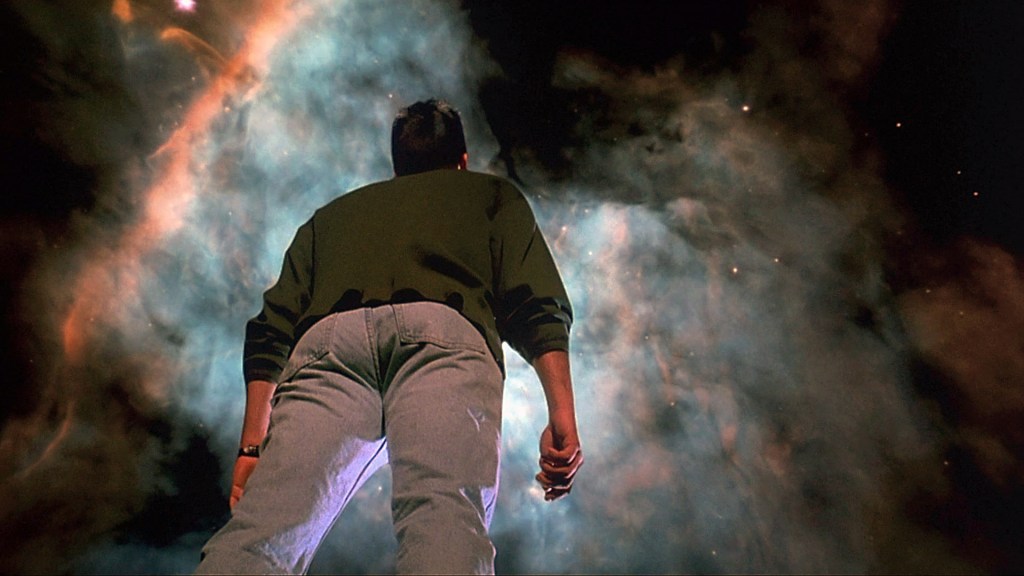
The Arrival (1996)
Another film from director David Twohy, who also wrote the script. It’s a conspiracy thriller about Charlie Sheen’s astronomer, who captures alien radio signals and is then embroiled in an attempt to cover up the discovery. It’s an especially good performance from Sheen as the awkward, geeky protagonist, and Twohy’s clever story takes in climate change, aliens and advanced technology. Reviews of this smart, lean sci-fi thriller were hugely positive, but frustratingly, the film failed to gain the traction it deserved.
Is it worth seeing? Very much so. The straight-to-video 1998 sequel, Arrival II, is not.
Available on: Amazon US, Amazon UK
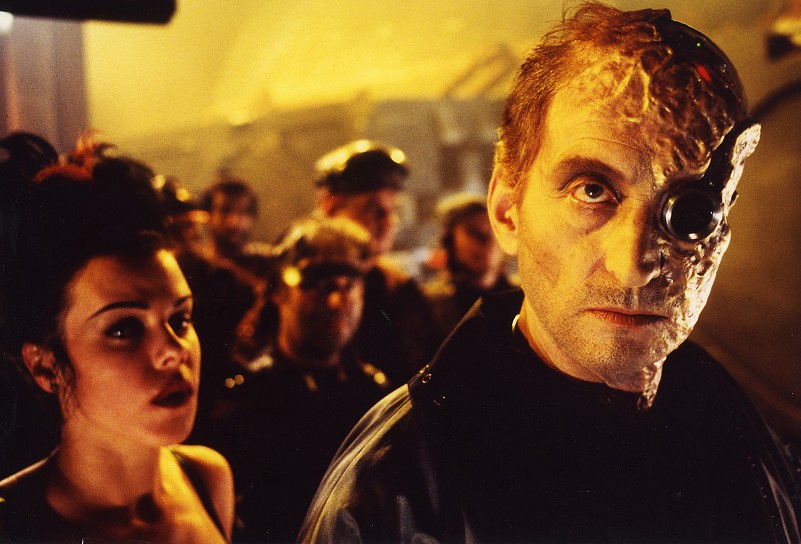
Space Truckers (1996)
Stuart Gordon’s output in the 90s was nothing if not eclectic. Space Truckers saw the horror maestro take on a big-budget sci-fi fantasy, and the result is like a kind of proto Guardians Of The Galaxy – well, minus the talking tree and Chris Pratt, of course. Although Gordon’s mischievous style of filmmaking’s probably better suited to the macabre horror of Re-Animator, From Beyond and Castle Freak (the latter released just one year before Space Truckers), there’s plenty to enjoy here, including some amusing performances from Dennis Hopper and Charles Dance – the latter unusually cast as a killer cyborg.
Is it worth seeing? It isn’t Gordon’s best film, but it’s still an entertaining bit of SF hokum.
Available on: Amazon US (for purchase), Amazon UK (for rent)
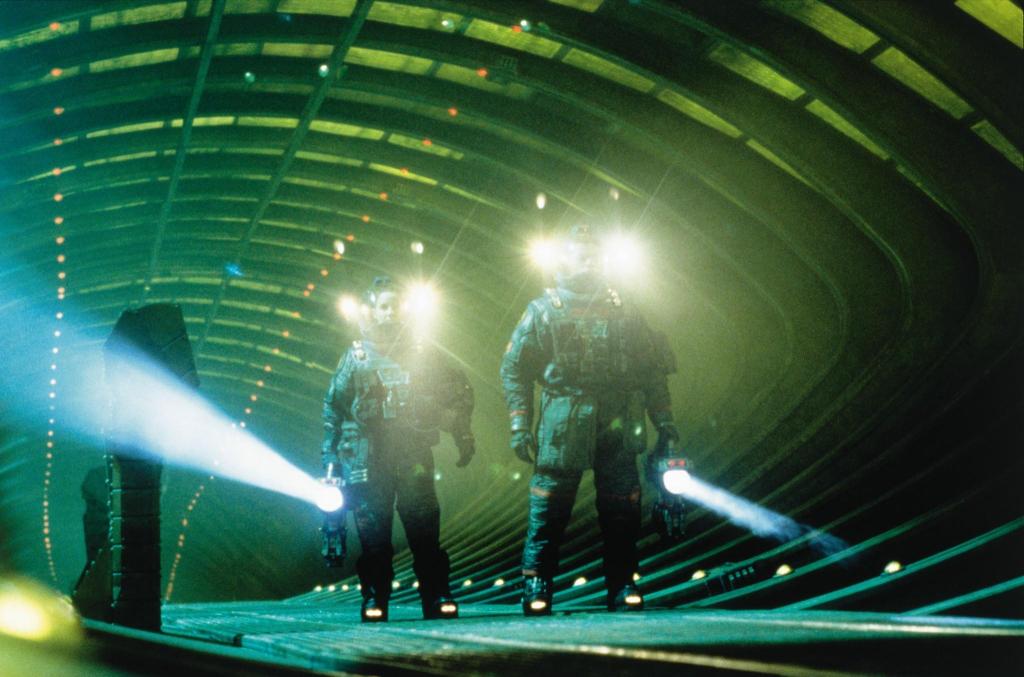
Event Horizon (1997)
Critics were largely hostile to this space-going horror opus. Your humble writer, for his sins, went to the cinema to see it twice. It’s a fairly straight gothic chiller in the Alien mould, with a crew exploring a seemingly deserted ship and realising too late that the demonic presence that killed the crew is still aboard.
A superb cast livens up the B-movie trappings of the script, and the production design’s excellent – the ship is a spiky, unnerving place you wouldn’t want to explore alone. Full marks to Sam Neill, too, for throwing himself into the role of Dr William Weir, a scientist slowly driven mad by his own creation. An even more gory version of Event Horizon once existed before the studio got hold of it.
Is it worth seeing? Your mileage may vary, but we’ve always had a soft spot for Event Horizon.
Available on: Amazon US (for rent), Amazon UK (for rent)
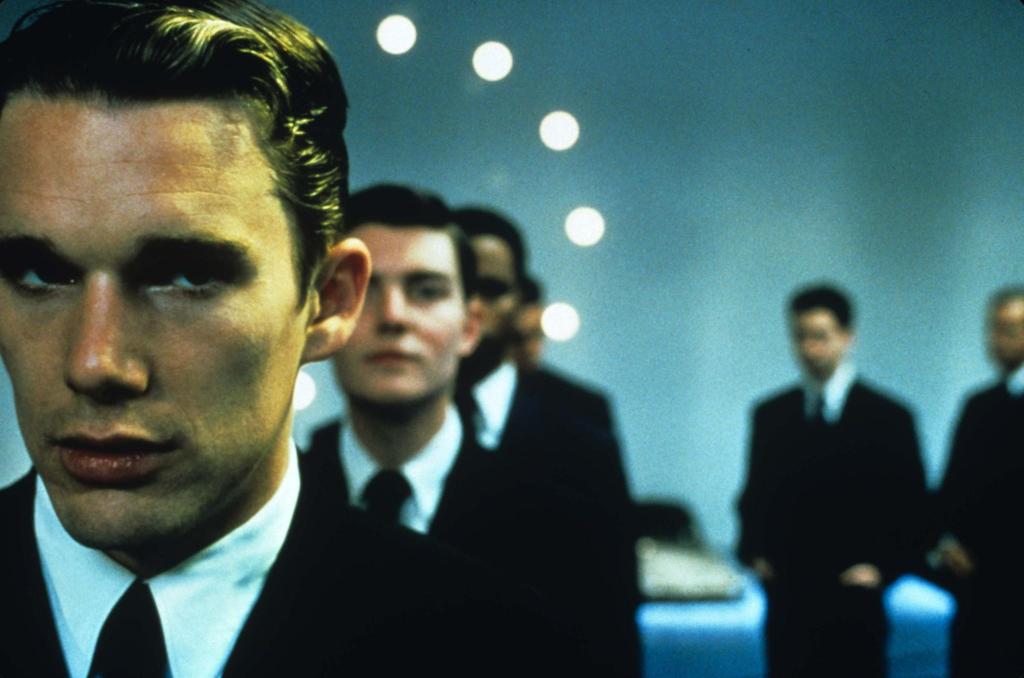
Gattaca (1997)
In a future where science is capable of making people physically and psychologically perfect, those with genetic flaws are pariahs. Ethan Hawke plays the outsider intent on defying the law and pursuing his dreams of becoming an astronaut, and the dramatic friction that results is breathtaking. Jude Law turns in a career-best performance as a disabled genius who becomes Hawke’s ally, while Michael Nyman’s score is devastatingly beautiful.
Is it worth seeing? If you haven’t seen it already, you must. It’s an absolute classic.
Available on: Amazon US, Amazon UK
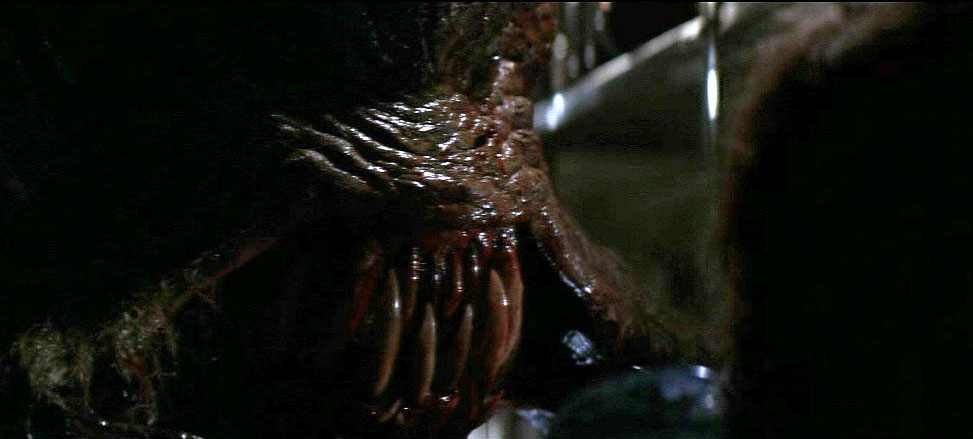
The Relic (1997)
Tom Sizemore spends much of this creature feature looking as though he’d rather be somewhere else, but the lighting’s so shadowy you can easily ignore this. An unabashed B-movie from an era that spawned an unusual number of them, The Relic’s about a huge, man-eating beast which runs amok in a Chicago museum. Sizemore’s joined by Penelope Anne Miller as an expert biologist looking for a means to halt the beast, which Stan Winston imagines as a cross between the Predator and a rhinoceros.
Is it worth seeing? Not the most memorable monster movie of the 1990s, but worth a watch.
Available on: Amazon US
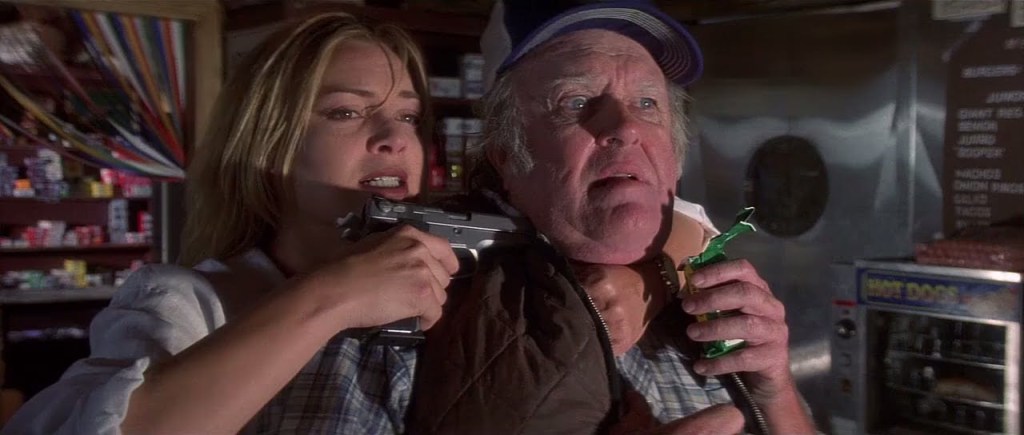
Retroactive (1997)
Like Nacho Vigalondo’s magnificently creepy Timecrimes (2007), Retroactive sees its central character repeatedly try to travel back and change the past, only to make things slightly worse each time. Kylie Travis stars as a young hitchhiker who falls into the orbit of a horribly shady character played by James Belushi, while Frank Whaley adn M Emmet Walsh are among the supporting cast. Low-budget but well-written, Retroactive‘s an absorbing time-travel thriller.
Is it worth seeing? Yes. It’s a bit of an underappreciated gem.
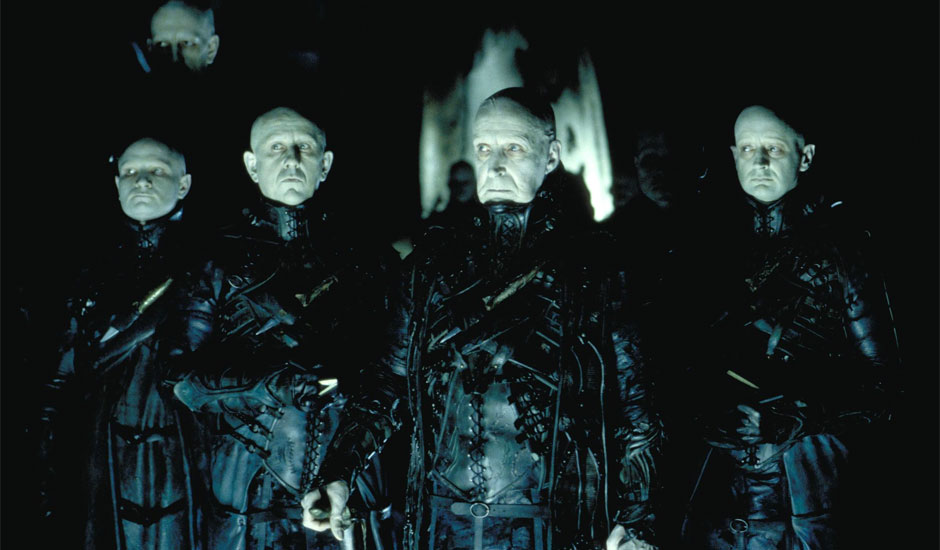
Dark City (1998)
Alex Proyas’ Dark City is often compared to The Matrix, with both films sharing similar themes and even one or two identical sets (both films were shot in Australia). But Dark City is more an urgent noir thriller with sci-fi undertones than the out-and-out action of The Matrix, and Proyas gives it a brilliantly brooding, murky feel. Rufus Sewell’s protagonist wakes up in an unfamiliar hotel room with a corpse nearby, and he’s soon on the run from an army of bald, gaunt figures who look like cousins of the Cenobites in Hellraiser. Like The Thirteenth Floor and eXistenZ, Dark City takes its cue from the writings of Philip K Dick; here, reality is paper thin, and you only have to prod a finger through it to see the disturbing truth that hides behind it.
Is it worth seeing? Good Lord, yes. It’s a corker.
Available on: Amazon US (for rent), Amazon UK (for rent)
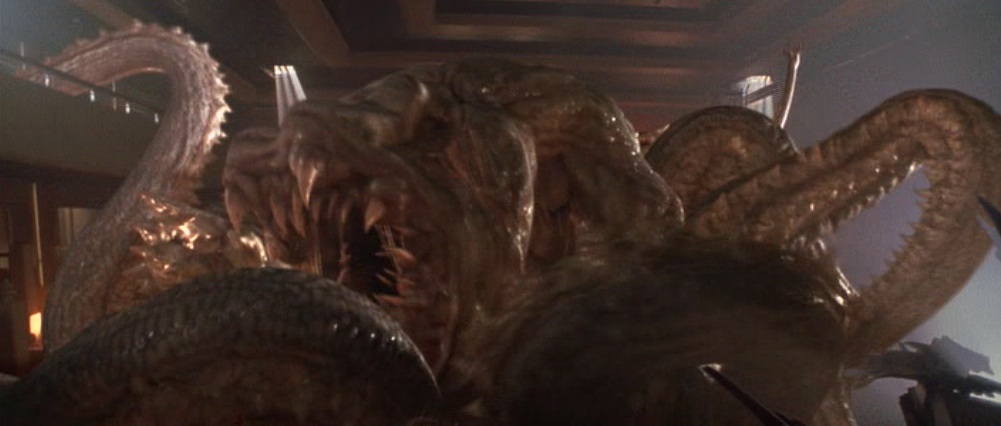
Deep Rising (1998)
Another 90s monster movie, this time on an abandoned ship in the middle of nowhere. Treat Williams leads an eclectic ensemble cast of likely victims (Famke Janssen, Wes Studi, Djimon Hounsou and Cliff Curtis are also among the familiar names), but the monster’s the real star – a big, tentacled thing that skulks around in the dark.
Is it worth seeing? It’s pure hokum, but trashily entertaining nevertheless.
Available on: Amazon US (for rent), Amazon UK (for rent)
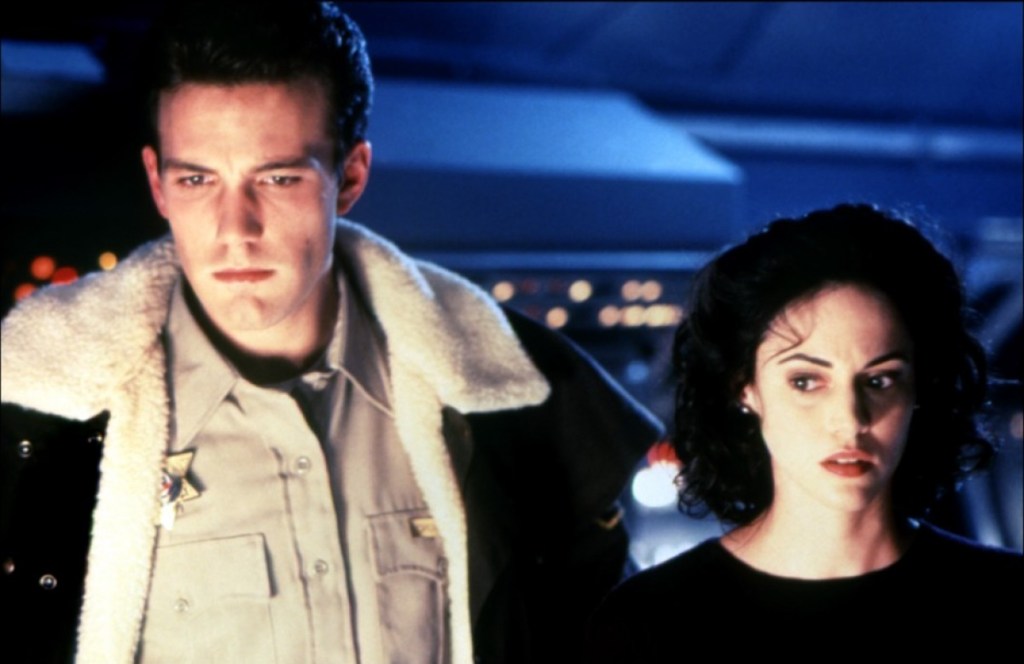
Phantoms (1998)
One year after he shared in the Oscar glory for Good Will Hunting, Ben Affleck starred in this sci-fi horror, also distributed by Miramax. It’s fair to say it didn’t quite share the former’s adulation or box-office success. Adapted by Dean Koontz from his own novel, Phantoms is a variation on The Thing; an entity has taken over a small town in Colorado, and is capable of mimicking the lifeforms it comes into contact with. Affleck plays a local sheriff, Peter O’Toole’s a scientist and Liev Schreiber’s another cop with the hilarious name Deputy Wargle. Appreciated as a pure B-movie, there’s lots to enjoy in Phantoms.
Is it worth seeing? Well, we quite like it.
Available on: Amazon US, Amazon UK (for rent)

Soldier (1998)
Following the expensive box-office disappointment of Event Horizon, director Paul W S Anderson leapt straight onto this, more straightforward sci-fi action flick. That it’s written by Blade Runner’s David Peoples might suggest that we’re in for something with a bit of philosophical depth, but it’s really more akin to Universal Soldier (with similarly bloody violence) than Ridley Scott’s seminal movie, occasional allusions aside. Kurt Russell’s dependably good in the lead, though, and Jason Scott Lee and Jason Isaacs are decent villains.
Is it worth seeing? Just about, if you’re in the mood for some 90s-style mayhem.
Available on: Amazon US (for rent)
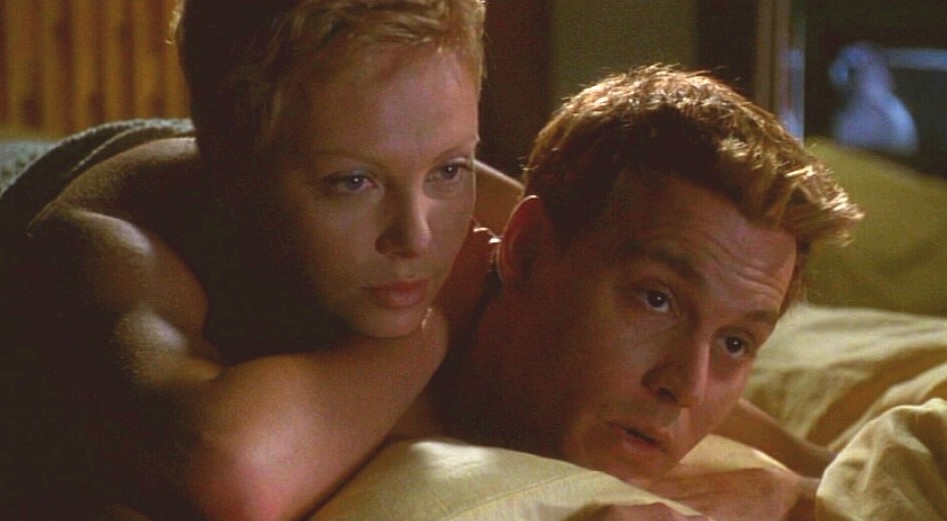
The Astronaut’s Wife (1999)
To all intents and purposes, this is Rosemary’s Baby with a possibly alien-possessed astronaut instead of Satan worship, and the results are as unimaginative as that sounds. Johnny Depp returns to Earth from a space mission a changed man, and Charlize Theron plays his increasingly concerned wife. There isn’t necessarily wrong with finding new slants on pre-existing ideas, but if you’re going to borrow from one of the most celebrated horror movies ever, you’d better be sure you have something new to add.
Is it worth seeing? Well, no. Not really. Charlize Theron deserved much better genre fare than this, and eventually got it with her superb role in Mad Max: Fury Road.
Available on: Amazon US (for rent)
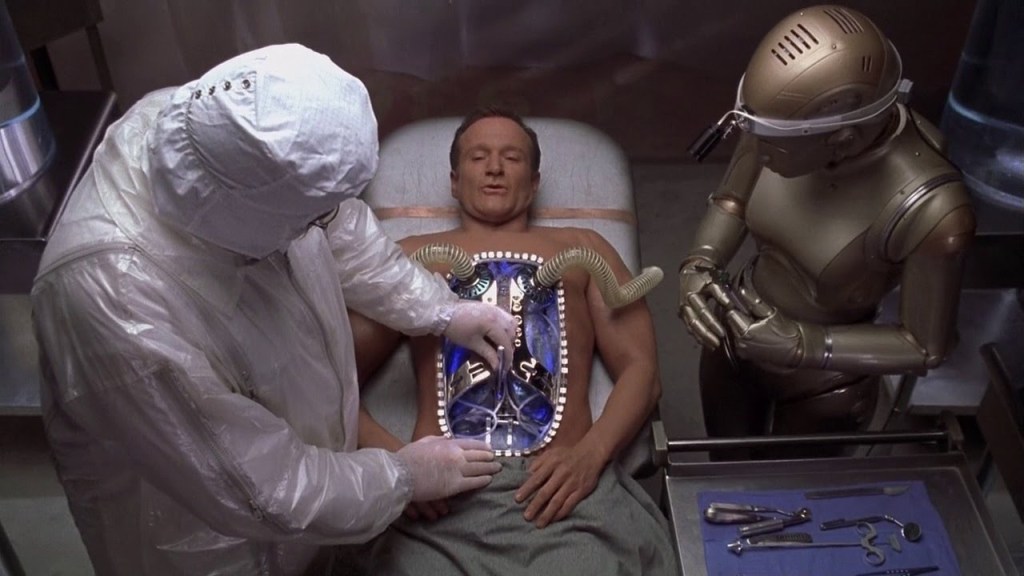
Bicentennial Man (1999)
Chris Columbus’s direction is bland, but even Bicentennial Man‘s grumpier critics would surely concede that Robin Williams’ performance as a robot who gradually becomes more human is a thoroughly moving one. Based on the writings of Isaac Asimov, it follows Williams’ humanoid machine as he evolves over the course of 200 years. It’s an uneven film, for sure, but highly effective in its best dramatic scenes.
Is it worth seeing? Yes, if only for Williams’ leading turn.
Available on: Amazon US (for rent), Amazon UK (for rent)
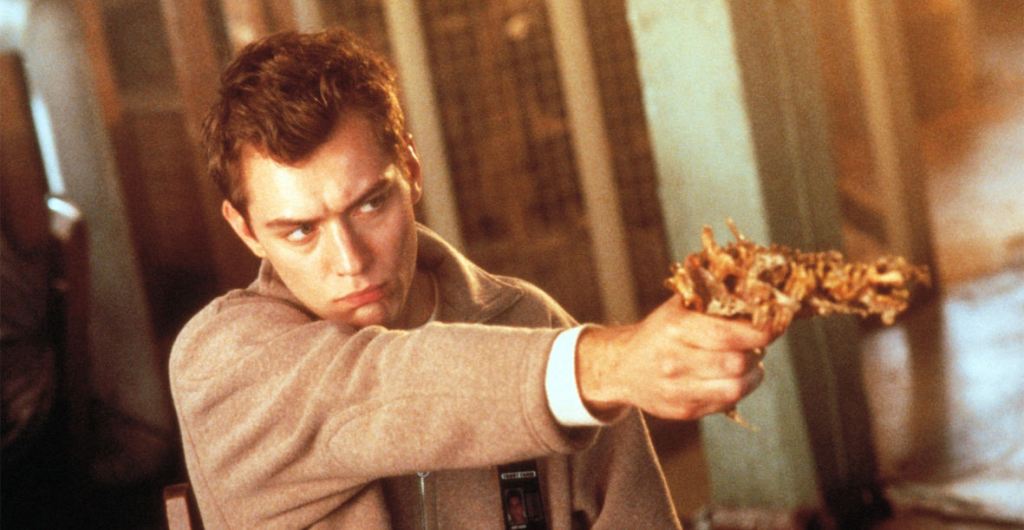
eXistenZ (1999)
David Cronenberg returned to his eariler brand of sci-fi horror only once in the 1990s, and it was for eXistenZ, a brilliantly-made piece of techno-surrealism that should have been a far bigger hit. Jude Law stars as Ted Pykul, a security guy for celebrity game designer Allegra Geller (Jennifer Jason Leigh). When Geller’s attacked by a group of terrorists who object to her reality-bending games machines, she and Pykul go on the run, seemingly escaping their clutches but finding traitors and assassins in the most unlikely places – even in eXistenZ, Geller’s latest and most inscrutible game.
Cronenberg returns to many of the themes and ideas he introduced in Videodrome here, and it could be said that eXistenZ doesn’t compare favourably to that early masterwork. But there’s something irresistibly off-kilter about the world Cronenberg creates, from its sexually-charged performances, freaky production design and insistent jabs of body horror. It all builds to a satisfying and clever pay-off that may just be the funniest in Cronenberg’s career to date.
Is it worth seeing? Without a doubt.
Available on: Amazon US (for rent)
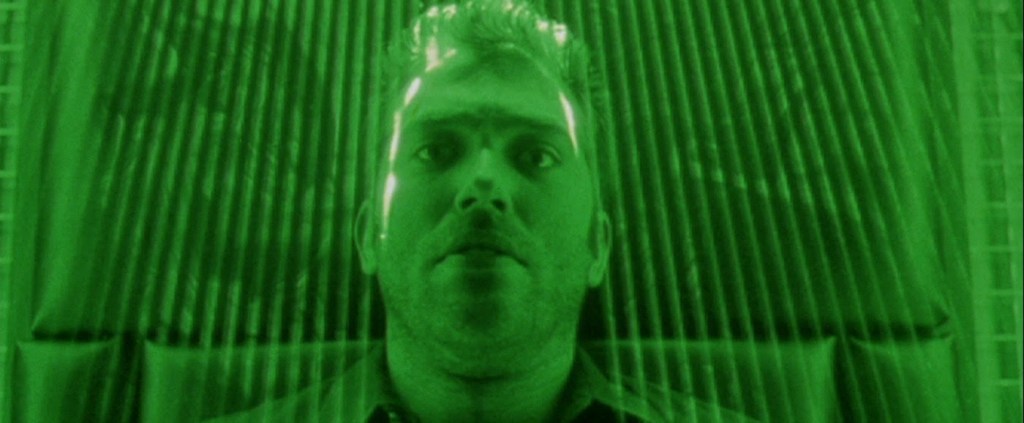
The Thirteenth Floor (1999)
Another late-90s thriller that plays with the boundary between fiction and reality, The Thirteenth Floor gives the sub-genre a film noir twist. In a simulated 1930s Los Angeles, Craig Bierko’s protagonist is trying to prove that he didn’t murder a computer genius played by Armin Mueller-Stahl. Other films handled their twists better, but The Thirteenth Floor has enough decent performances (Gretchen Mol, Vincent D’Onofrio) and clever moments to make it worth a watch.
Is it worth seeing? It’s certainly better than its initially negative reviews suggested.
Available on: Amazon US (for rent), Amazon UK (for rent)
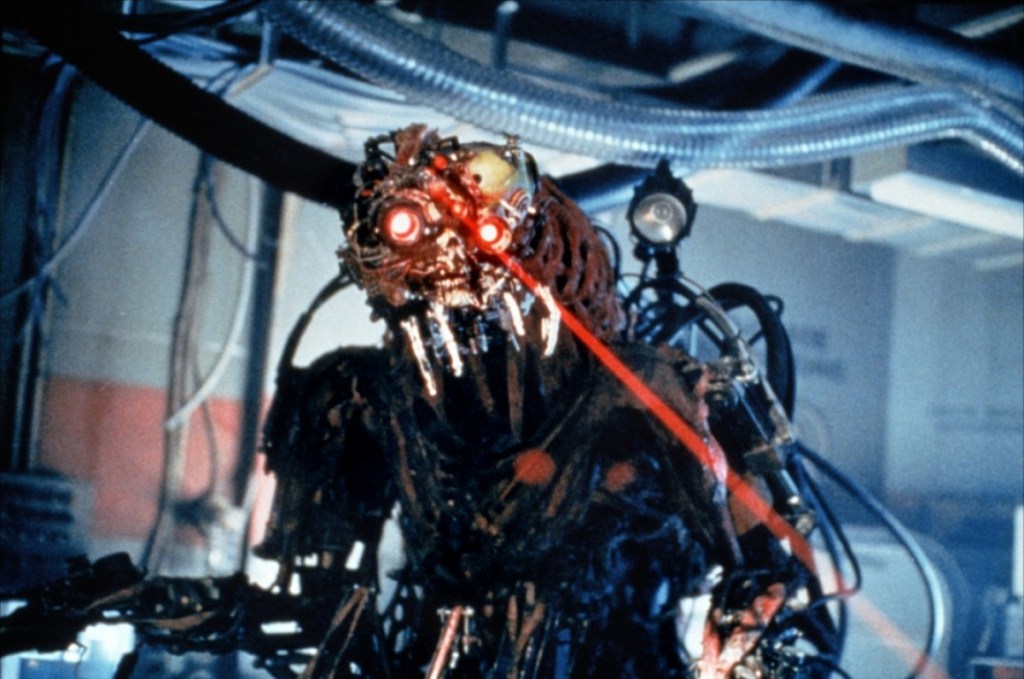
Virus (1999)
Even experienced producer Gale Anne Hurd (The Terminator, Aliens) couldn’t steer this disappointing expensive space thriller to box-office success. Based on the comic of the same name, it sees an alien life form create deadly cyborgs out of dead humans and bits of scientific equipment. A solid cast, which includes Jamie Lee Curtis, William Baldwin and Donald Sutherland, can’t save what is essentially a creaky (and at $70m, incredibly expensive) version of Hardware set on a boat.
Is it worth seeing? The effects are excellent, but everything else is gloomily derivative.
Available on: Amazon US (for rent)
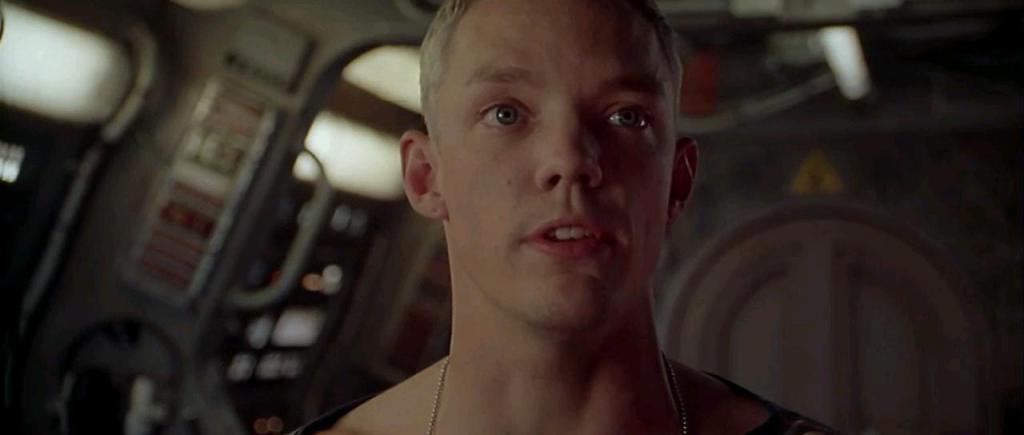
Wing Commander (1999)
Attempting to take the hit videogames and craft them into a Star Wars-type crowd-pleaser, Wing Commander was roundly upstaged by 1999’s genre big-hitters – among them a certain Star Wars prequel. Everything about Wing Commander is weirdly ill-conceived, from its cast (a dull Freddie Prinze Jr, a maniacal Matthew Lillard) to some spectacularly awful miniature effects and alien suits. More strangely still, the videogames actually had a better roster of actors than the movie. Christopher Walken, Malcolm McDowell, John Hurt and Clive Owen had appeared in the games, while Wing Commander: the motion picture had to make do with a very uncomfortable-looking David Warner and David Suchet.
Is it worth seeing? No.
Available on: Amazon UK (for rent)